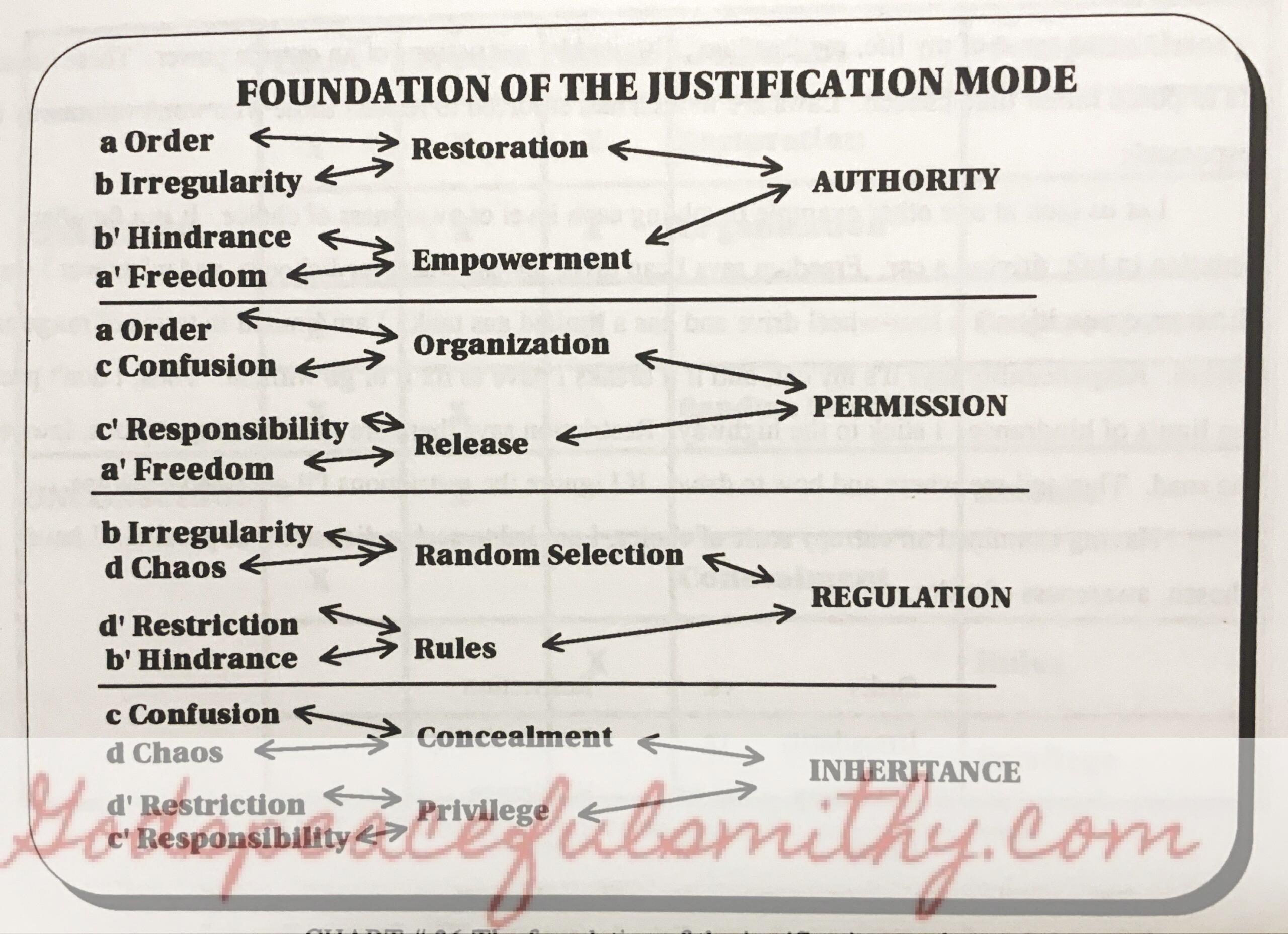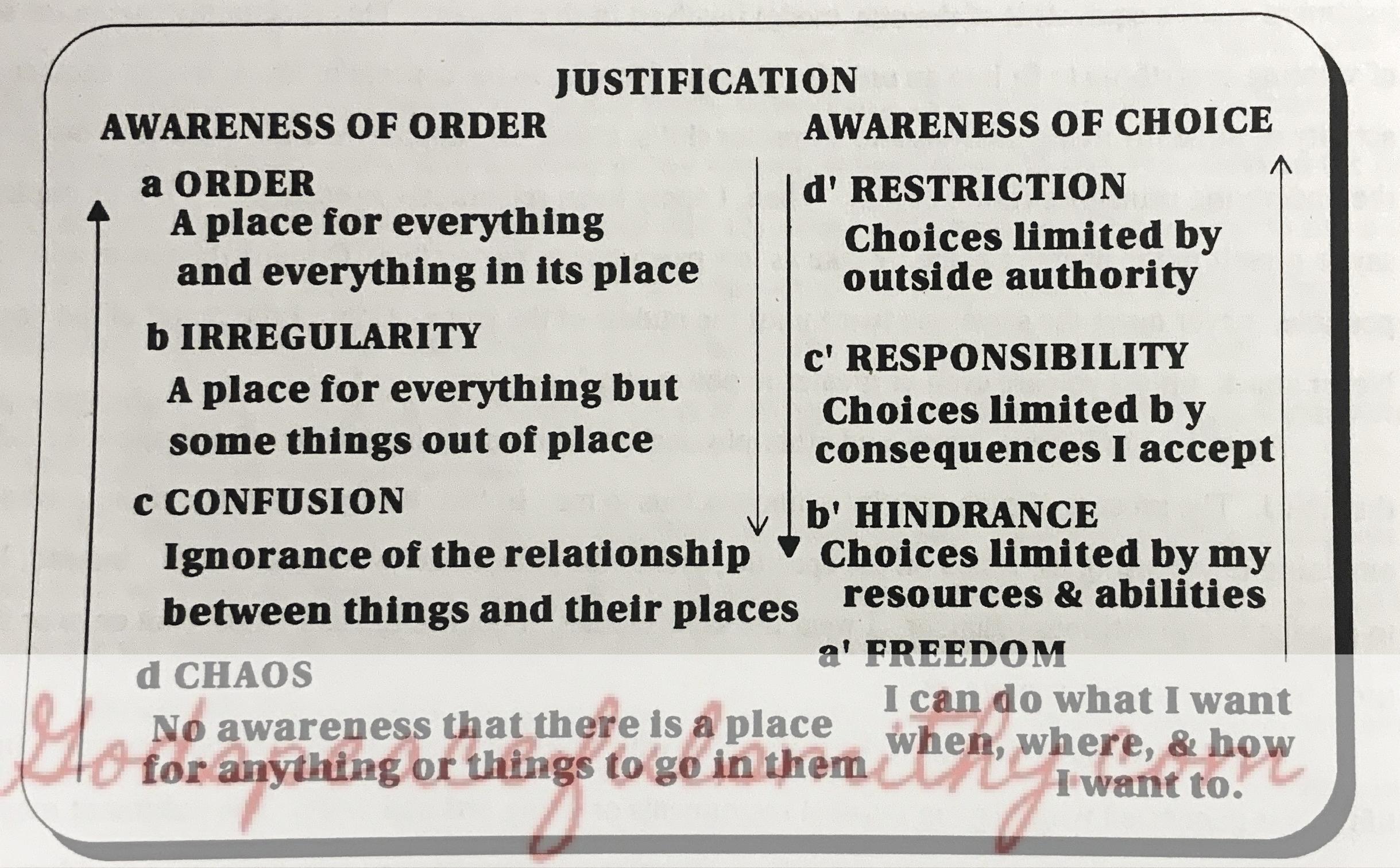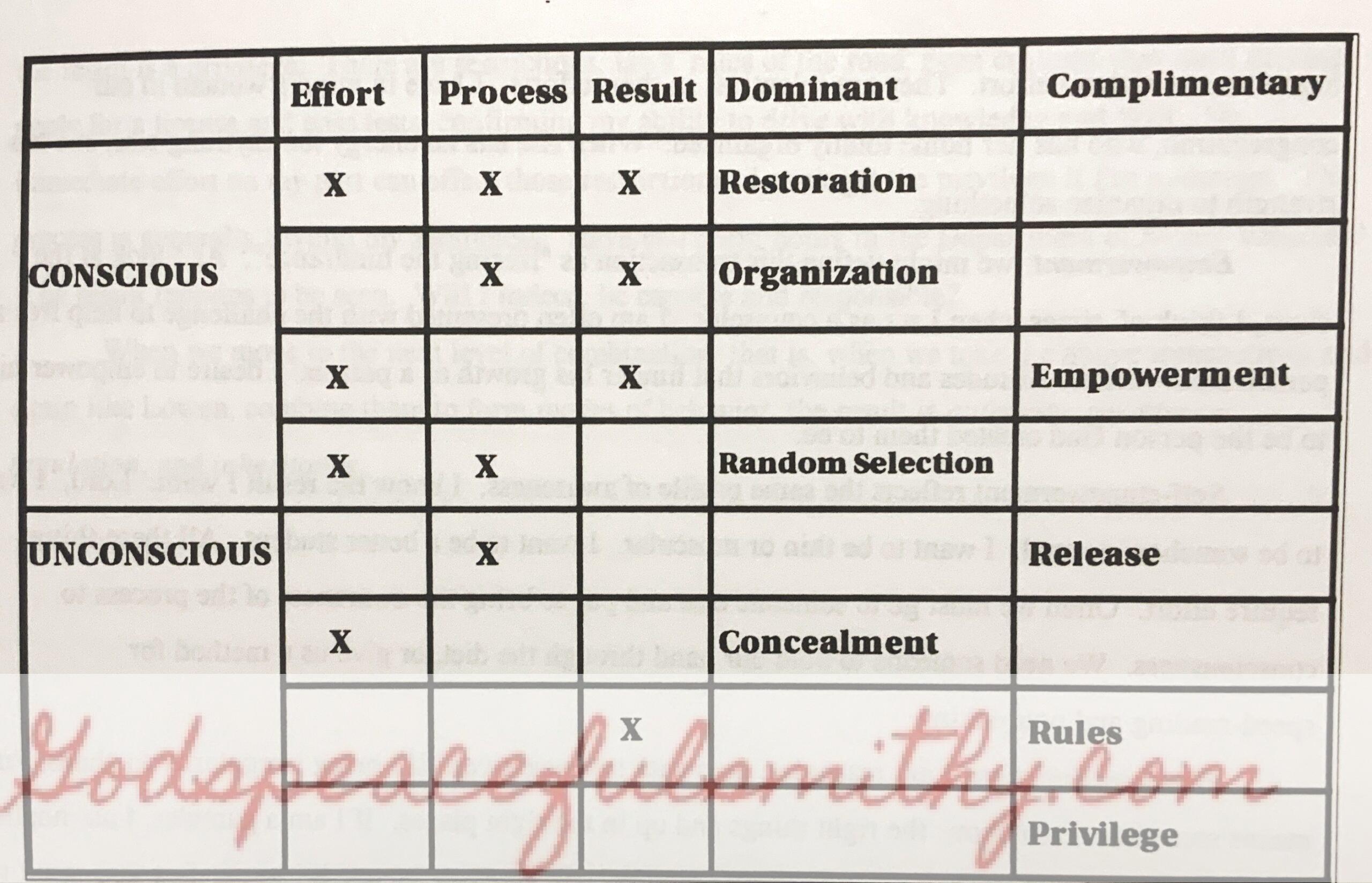
The Justification mode is the last in this series. Next we will look at how they can be clues for Spiritual Direction.
If you haven’t already you may want to read the other post on these topic first. Click here to begin.
Another aspect of the Christian life and of conversion is the area of choice. What is the relationship between the saving act of God, and our ability to choose to receive the gift? Let us first look at a scale of awareness/consciousness of choice.

At the highest level is freedom. I can do what I want when I want. But freedom is, in many ways, limited. I suggest therefore, in the context of our understanding of entropy, that the next level down is hindrance. With hindrance my choices are limited by my abilities and resources. No one will stop me. But if I can’t swim, if I have no water and/or I don’t know how, I am hindered. Conversely, I can move towards greater freedom if I apply abilities and resources. If I have saved my money, I can buy a membership at the YMCA and take swimming lessons.
My choices are also limited by responsibility. I am defining responsibility as those areas in which the ability to respond is tied to the results. I accept these results take priority over other activities I might wish to do. I am responsible on the job, and to show up to work, even though I might want to sleep in.
In some areas of my life, my freedom is limited by restrictions of an outside power. These limits are imposed rather than chosen. Laws are written, and enforced to restrict those who won’t voluntarily be responsible.
Let us look at another example involving each level of awareness of choice. It is a familiar situation in life: driving a car. Freedom says I can drive my car wherever I choose, and whenever I want. Hindrance says it’s not a four-wheel-drive and has a limited gas tank. I am limited in terms of range, and terrain. Responsibility says it’s my car, and if it breaks, I have to fix it or go without. Thus, I don’t push the limits of hindrance. I stick to the highway. Restriction says there are rules and regulations, laws of the road. They tell me where and how to drive. If I ignore the restrictions, I’ll get fined or worse.
Having examined in entropy scale of choice. I am led to seek a dichotomous parallel. I have chosen, awareness of order.
Order vs Restriction
Irregularity vs Responsibility
Confusion vs Hindrace
Chaos vs Freedom
It is a matter of condition versus choice. Take, for example, the serenity prayer.
God grant me the serenity to accept the things I cannot change (Condition)
The courage to change the things I can. (Choice)
The wisdom to know the difference. (Awareness)
Let us look at the side of condition. At the highest level is order. I have defined order, as a place for everything and everything in its place. Next there is irregularity. A place for everything but somethings in the wrong place. Below this, in entropy, is confusion. I defined confusion as ignorance of the relationship among things, and the places where they belong. Were there is chaos there is no place for anything.
Let us use a puzzle for example. At the level of order, the puzzle is complete. I chose the example, because I am currently doing a series of picture puzzles. I have three in a complete state of order. They are completed; held together with tape on the back, and hanging on my wall.
While I am in the process of doing a puzzle it sometimes slips into irregularity. For example, I know the finished dimensions but making mistakes give me a distorted picture.
What if someone gives me a puzzle without the box. It could be a square, or round, or even three dimensional. How could I do it without knowing. Clearly, confusion is a good description of this situation.
Chaos is the next level of entropy; the next level in lack of order. Suppose I stumble upon things but don’t know they belong together. Think of people building a highway and stumble upon an archaeological site. They could easily destroy things that belong together.
Let us now again apply Lowen’s chart of awareness/consciousness to these transactional roles.
Restoration: To order irregularity takes awareness. One must know what is, what should be, and how to get from here to there. The Biblical example of Nehemiah and the wall of Jerusalem is a good one. Before Nehemiah begins the task of restoring the walls he examines them carefully to be aware of the requirements of the task.
“By night I went out through the Valley Gate toward the Jackal Well and the Dung Gate, examining the walls of Jerusalem, which had been broken down, and its gates, which had been destroyed by fire. Then I moved on toward the Fountain Gate and the King’s Pool, but there was not enough room for my mount to get through; so I went up the valley by night, examining the wall. Finally, I turned back and reentered through the Valley Gate. The officials did not know where I had gone or what I was doing, because as yet I had said nothing to the Jews or the priests or nobles or officials or any others who would be doing the work. Then I said to them, “You see the trouble we are in: Jerusalem lies in ruins, and its gates have been burned with fire. Come, let us rebuild the wall of Jerusalem, and we will no longer be in disgrace.” I also told them about the gracious hand of my God on me and what the king had said to me.They replied, “Let us start rebuilding.” So they began this good work.”
Nehemiah 2:13-18
Organization: to order confusion is a similar task. One needs to be conscious of what should be (the order) in the midst of what is confused. Those who have this ability seem to bring about organization without effort. They are relentless in their efforts. I have in mind, a woman in our congregation, who has her home totally organized. When she has no energy for anything else, she has strength to organize something.
Empowerment: we might to find this transaction as freeing the hindrance. As I look at the chart, I think of times when I act as a counselor. I am often presented with a Challenge to help free a person from various attitudes and behaviors that hinder his or her growth as a person. I desire to empower them to be the person God created them to be.
Self-empowerment reflects the same profile of awareness. I know the results I want. Lord, I want to be somehow normal. I want to be thin or muscular. I want to be a better student. All these things require effort. Often we must go to someone else and pay to bring the awareness of the process to consciousness. We need someone to hold our hand through the diet, or give us a method for speed reading or note taking.
Random selection: I am reasoning here with two negatives. If I bring irregularity to chaos, this means, sometimes, somehow, the right things end up in the right places. If I am a gambler, I am hoping the trouble I go through (effort) to place a bet (process) will give me the results I want. But that result is completely out of my knowing ahead of time. Otherwise it’s no gamble. It’s a sure thing.
Release: I am reminded of the old joke about the man who fell off of a cliff on a dark night. On the way down he grabs a branch. Not being able to climb up or down, and not knowing how far it is to the bottom because of the darkness, he cries out “ Is there anyone up there who could help me?”A response comes back, “Trust in me and let go.” The man thinks it over, and cries out again, “Is there anyone else out there who can help me?“
In release, there is no effort in letting go. We know the process, in this case, “trust and let go.” However, the result is still in the dark.
Concealment: it takes a lot of effort to confuse the chaos. Think of a dysfunctional family system. Denial (concealment) of the chaotic life style wears on everyone.
Rules: rules are rules. They come with no effort on my part, and I don’t really understand the process. “Why can’t I do that?” “Because I said so!” “Because I’m the adult and you’re the child!”
Privilege: this one was difficult for me to deduce. I was thinking of the example of driving a car. I remember my lessons from driver education in high school, and this word came back to me. Being able to drive it’s not a right, it’s a privilege. I reason that when responsibility overlaps restriction the results is a privilege. There are restrictions, laws, rules of the road, even customs that limit driving. I apply for a license to pass a test, confirming my ability to drive with knowledge and skill. No immediate effort on my part can affect those restrictions. I can’t get the Privilege if I’m under age. The Process is generally beyond my awareness. Have you spent hours in the department of motor vehicles? The result remains to be seen. Will I indeed be capable and responsible?
When we move to the next level of combination, that is, when we take the above transactions, and again, like Lowen, combine them to four modes of behavior. The result is authority, permission, regulation, and inheritance.
In the next post, we will explore clues for spiritual direction to come from the religious modes. Go there now ! Click here.

